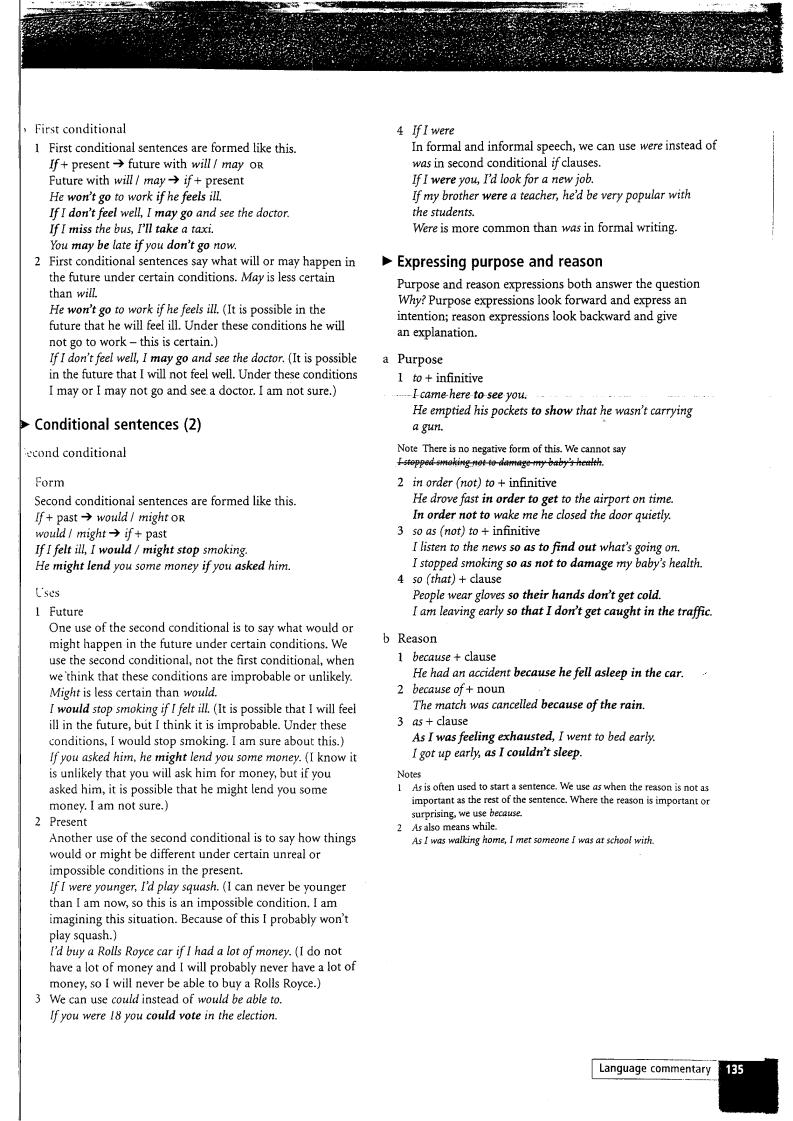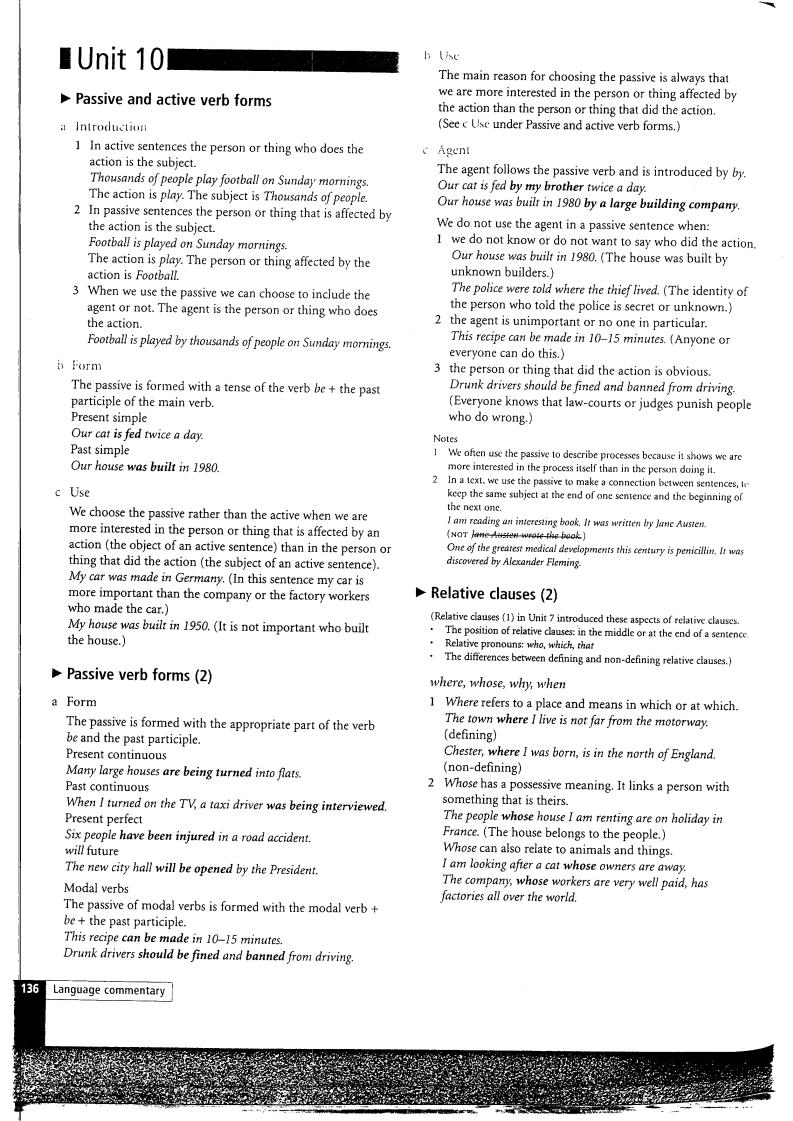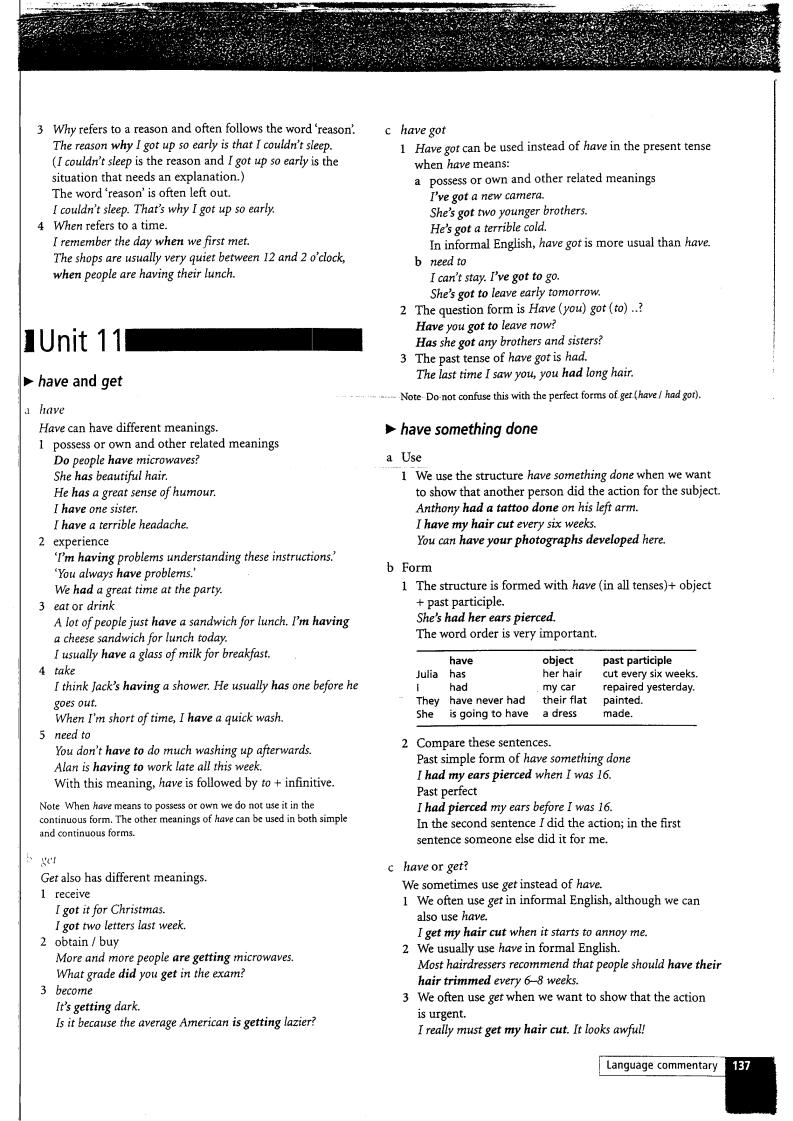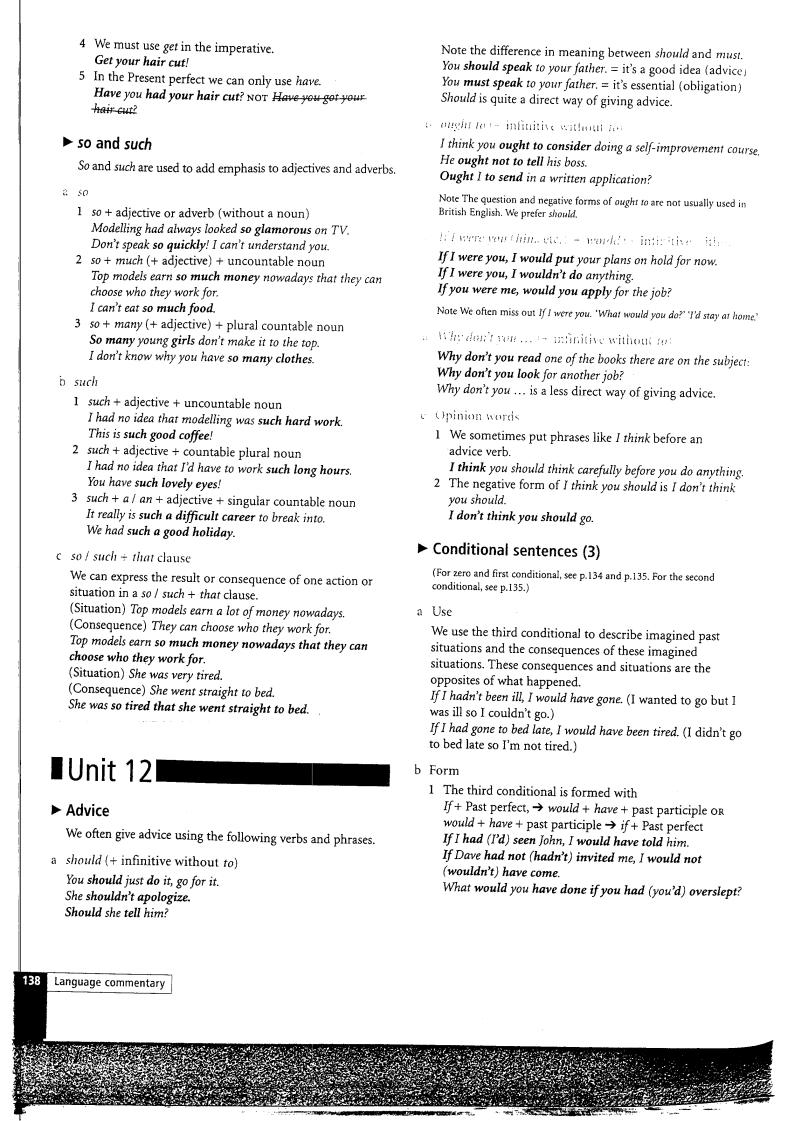
Landmark Intermediate Students Book
.pdf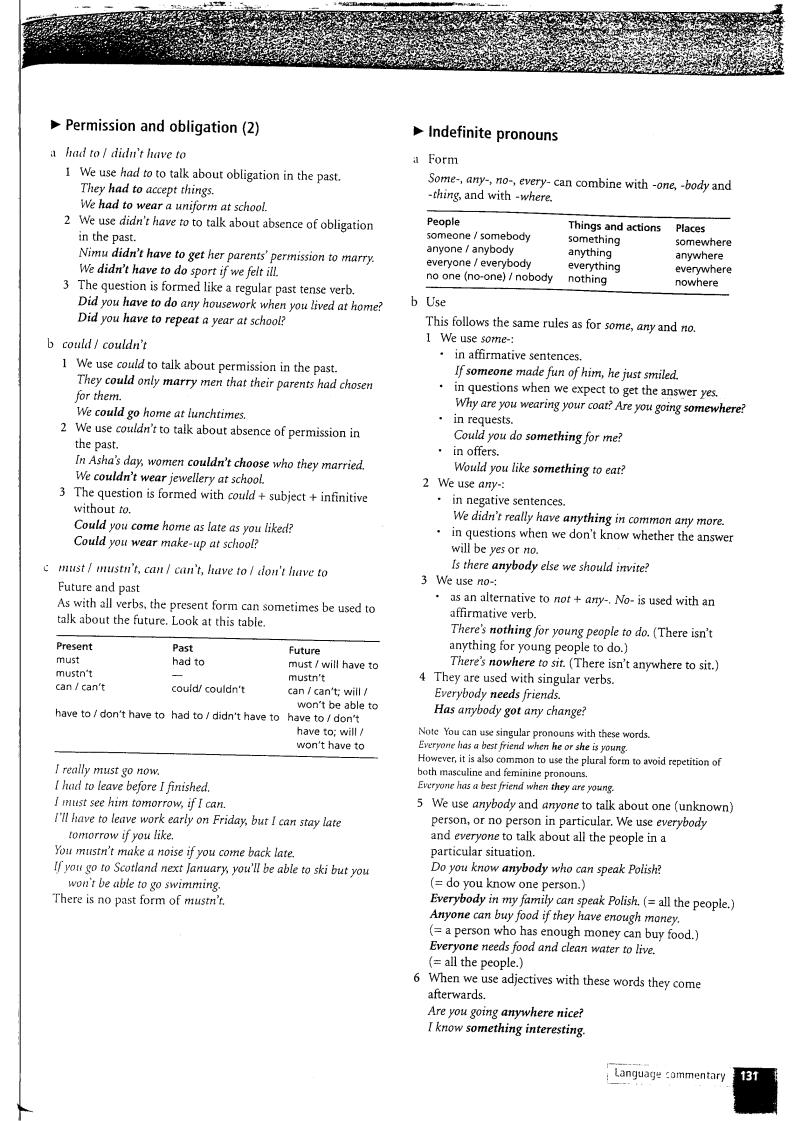
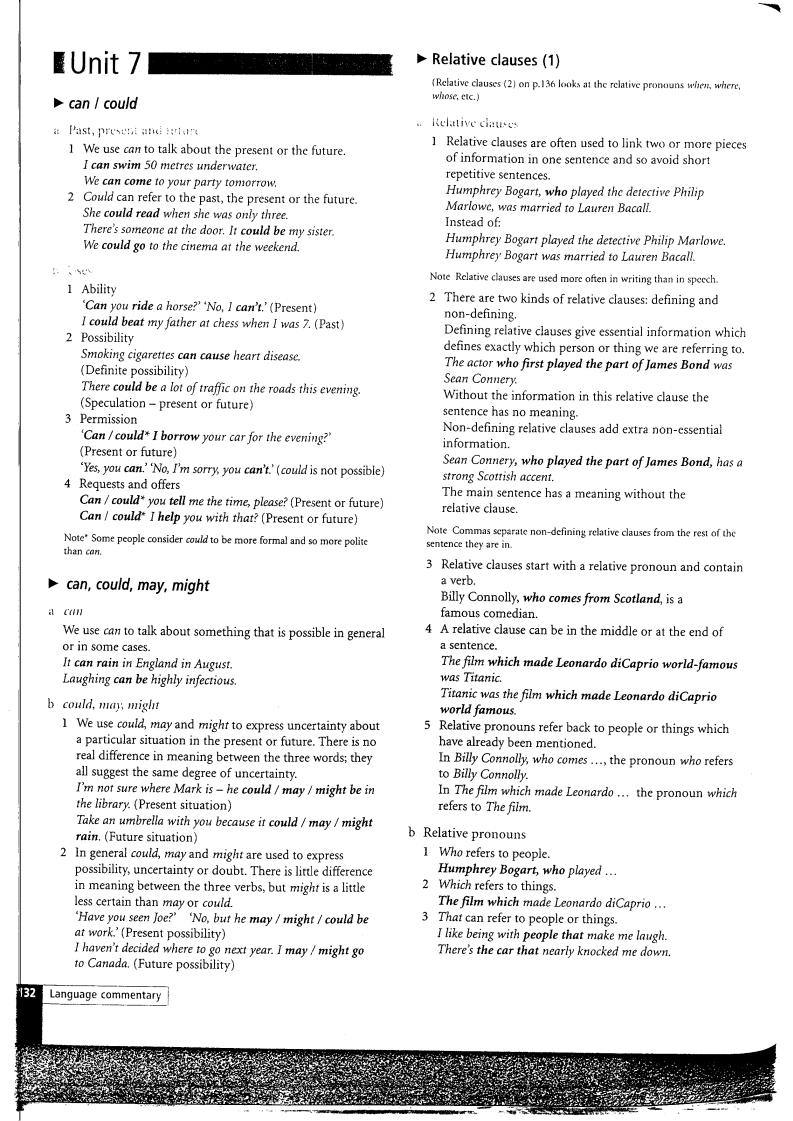
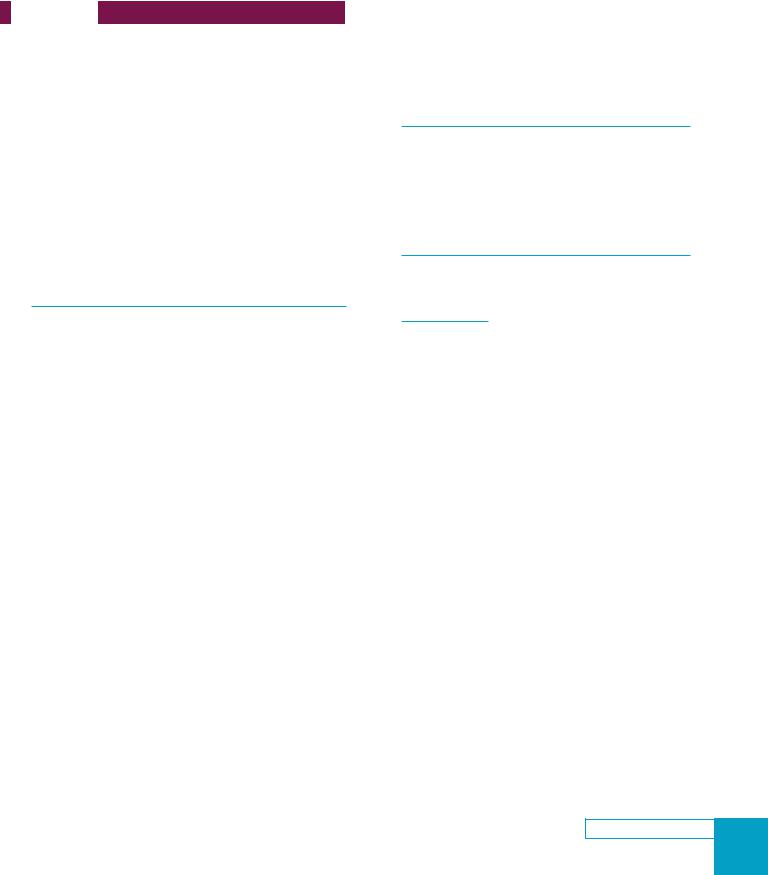
Notes
1That cannot be used in non-defining relative clauses.
The film, which opened last week, has already made $30m. NOT The film, that opened last week, has …
2That is more common in speech than which.
Unit 8
Reported speech (1): statements
aDirect speech and reported speech
1Direct speech = the actual words someone uses when they speak.
‘My name’s Jean. I work in a bank.’
2Reported speech = the words we use to tell someone what another person has said. We don’t use exactly the same words.
She said her name was Jean and she worked in a bank.
bDifferences between direct and reported speech
• Verbs
1We often move the tense of the verb back in time, for example from present to past. This happens when we report someone’s words some time after they have spoken.
Direct |
Reported |
Present simple |
Past Simple |
‘I live in a flat in the town centre.’ |
He said he lived in a flat in |
|
the town centre. |
Present continuous |
Past continuous |
‘I’m learning to drive.’ |
She said she was learning |
|
to drive. |
Present perfect |
Past perfect |
‘We’ve finished work early.’ |
They said they had finished |
|
work early. |
Past Simple |
Past perfect |
‘I arrived at 10.00 a.m.’ |
She said she had arrived at |
|
10.00 a.m. |
will / won’t future |
would |
‘I’ll / I won’t see you on Friday.’ |
You said you’d / you |
|
wouldn’t see me on Friday. |
can / can’t |
could / couldn’t |
‘I can’t wait to get home.’ |
He said he couldn’t wait to |
|
get home. |
|
|
2The verb tense does not have to change when the information we are reporting is still true.
‘I’m learning to drive.’
She said she’s learning to drive.
‘I saw him yesterday.’
She said she saw him yesterday.
The verb tense also does not change when the reporting verb is in the present tense.
‘I’m learning to drive.’
She says she’s learning to drive.
•Pronouns
1I changes to he or she.
‘I feel tired.’
He said he felt tired.
2We changes to they.
‘We’re going soon.’
They said they were going soon.
3You changes to I.
‘You don’t look very well.’
He said I didn’t look very well.
4Object pronouns also change.
‘I’ll give you a ring.’
She said she’d give me / us a ring. ‘They’re coming to see me soon.’
He / She said they were coming to see him / her soon.
•Time references
References to time change when we report words at a different time.
Direct
next week / year, etc.
last month / year
tomorrow yesterday now
a week ago
Reported
the following week / year the week / year after
the previous month / year the month / year before the next / following day
the day before / the previous day then / at that time
a week earlier / before
• Place references
References to place change when you are reporting words from a different place.
here |
there |
to come |
to go |
|
|
Reported speech (2): questions
aDifferences between direct and reported questions
1We make the same changes to verb tenses, pronouns and time and place references as we do when we report statements.
‘Can you come to my party next weekend?’ he asked.
He asked if I could go to his party the following weekend.
2The word order in reported questions is the same as the word order in statements. The subject is after the verb.
‘What have you done?’ she asked.
She asked what I had done.
3The auxiliary verbs do / does / did are not used in reported questions.
‘Where do you live?’ he asked.
He asked me where I lived.
‘What time did you get up?’ she asked.She asked what time I got up.
b Different types of question
1When we report Wh- questions we use the same question word(s).
‘Why are you here?’ she asked.She asked why I was there.
‘How much do you earn?’ they asked.
They wanted to know how much I earned.
Language commentary 133
LANDMARK INTERMEDIATE STUDENT’S BOOK
© Oxford University Press www.oup.com/elt
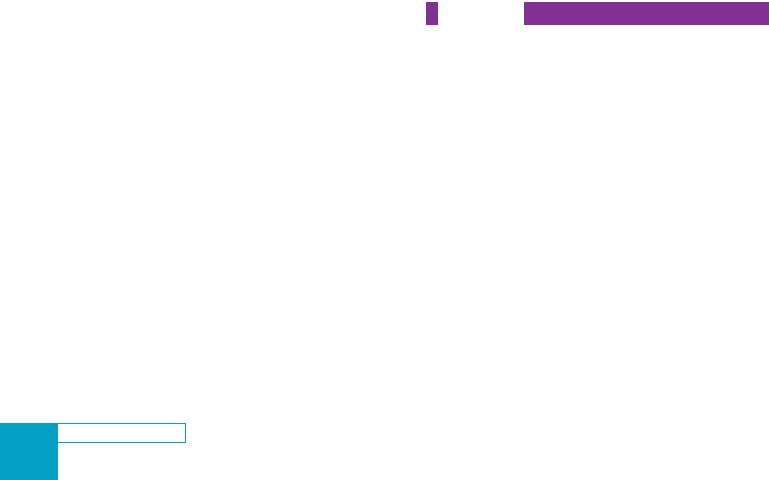
2When we report Yes / No questions we need to add if or whether.
‘Would you like a coffee?’ she asked.
She asked if / whether I’d like a coffee.
‘Are you going abroad for your holiday?’ he asked.
He asked whether / if we were going abroad for our holiday.
Expressing quantities
a Small quantities
• few / a few
1Few and a few are followed by plural nouns.
Few people came to the match but millions watched on TV. I’m going out with a few friends this evening.
2Few, a few and many can also be followed by of + determiner + plural noun.
A few of my friends like classical music, but most of them prefer jazz.
3Few means not many or hardly any. This sound negative. A few means some or a small number. This sounds neutral or positive.
Note The expression quite a few means a surprising number, the same as quite a lot.
• little / a little
1Little and a little are followed by uncountable* nouns.
We’d better hurry. There is little time left. I’ve still got a little more work to do.
2A little can also be followed by of + article + uncountable* noun.
I spent a little of the money on books.
A little means some or a small quantity. This sounds neutral or positive.
3Little means not much or hardly any. This sounds negative.
You’ve got little chance of getting that job. Lots of people have applied for it.
*A countable noun is a noun which has a plural form. Student(s) / computer(s)
*An uncountable noun has no plural form, because it refers to something which we see as a ‘mass’, not as individual things. Time / money / water
5Many and much are more often used in negative sentences and in questions than in affirmative statements.
How many birthday presents did you get? I didn’t get much sleep last night.
• a lot of / lots of
1A lot of and lots of can be followed by a plural countable noun or an uncountable noun.
I’ve got lots of time.
A lot of my friends play tennis.
2In affirmative statements, a lot of is usually used instead of much or many.
He had a lot of money.
She always meets a lot of people when she travels.
3Lots of is more informal than a lot of.
• plenty of
1Plenty of can be followed by a plural countable noun or an uncountable noun.
I’ll pay for the drinks. I’ve got plenty of money with me. It’s a great place for a holiday. There are plenty of things to do.
2Plenty of means as much or as many as you need for a particular purpose.
• some
1Some can be followed by a plural countable noun or an uncountable noun.
Some people have never used an answerphone. Can you lend me some money?
2Some means an unspecified quantity, not all.
Unit 9
Conditional sentences (1)
(There are four common types of conditional sentences: zero, first, second and third.
•Zero and first conditional sentences: notes in this section.
•Second conditional sentences: notes on p.135.
•Third conditional sentences: notes on p.138.)
b Large quantities
• many / much
1Many is followed by a plural noun.
I don’t get many headaches.
2Much is followed by an uncountable noun.
We haven’t got much time. How much money have you got?
3Many and much can also be followed by of.
Many of the people who were at university with me now work abroad.
How much of your time do you spend working?
4Many means a large number. Much means a large quantity.
a Zero conditional
1 Zero conditional sentences are formed like this.
If + present, present OR Present if + present
If I wake up early, I have a cup of tea and read the newspaper.
I walk to work if it isn’t raining.
2Zero conditional sentences say what is usually true or always happens under certain conditions.
If it rains, I drive to work. (I always do this when it rains. This happens quite regularly.)
If you eat too much, you get fat. (This is generally true.)
3In some zero conditional sentences we could say when or whenever instead of if.
When / whenever it rains, I drive to work.
134 Language commentary
LANDMARK INTERMEDIATE STUDENT’S BOOK
© Oxford University Press www.oup.com/elt
